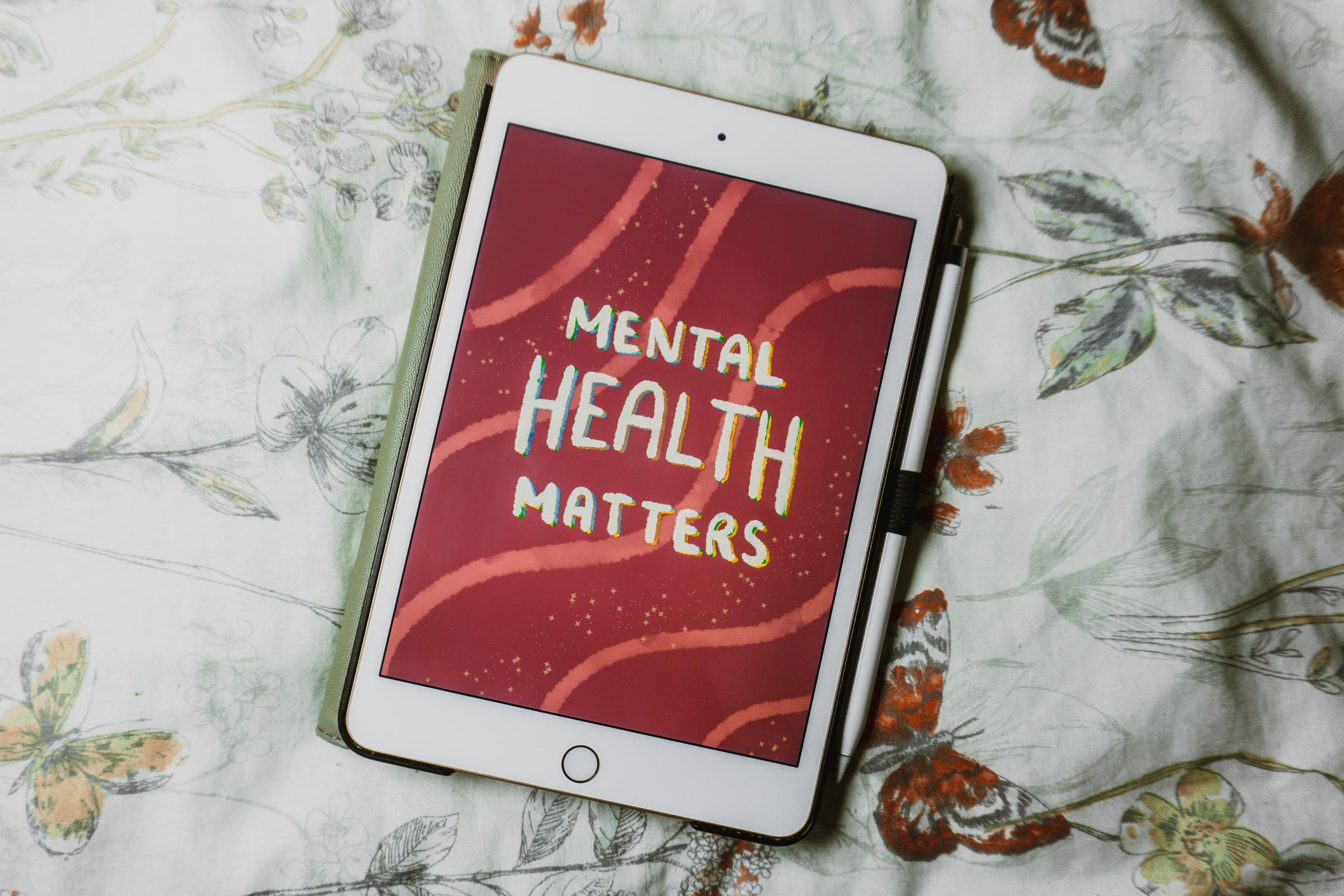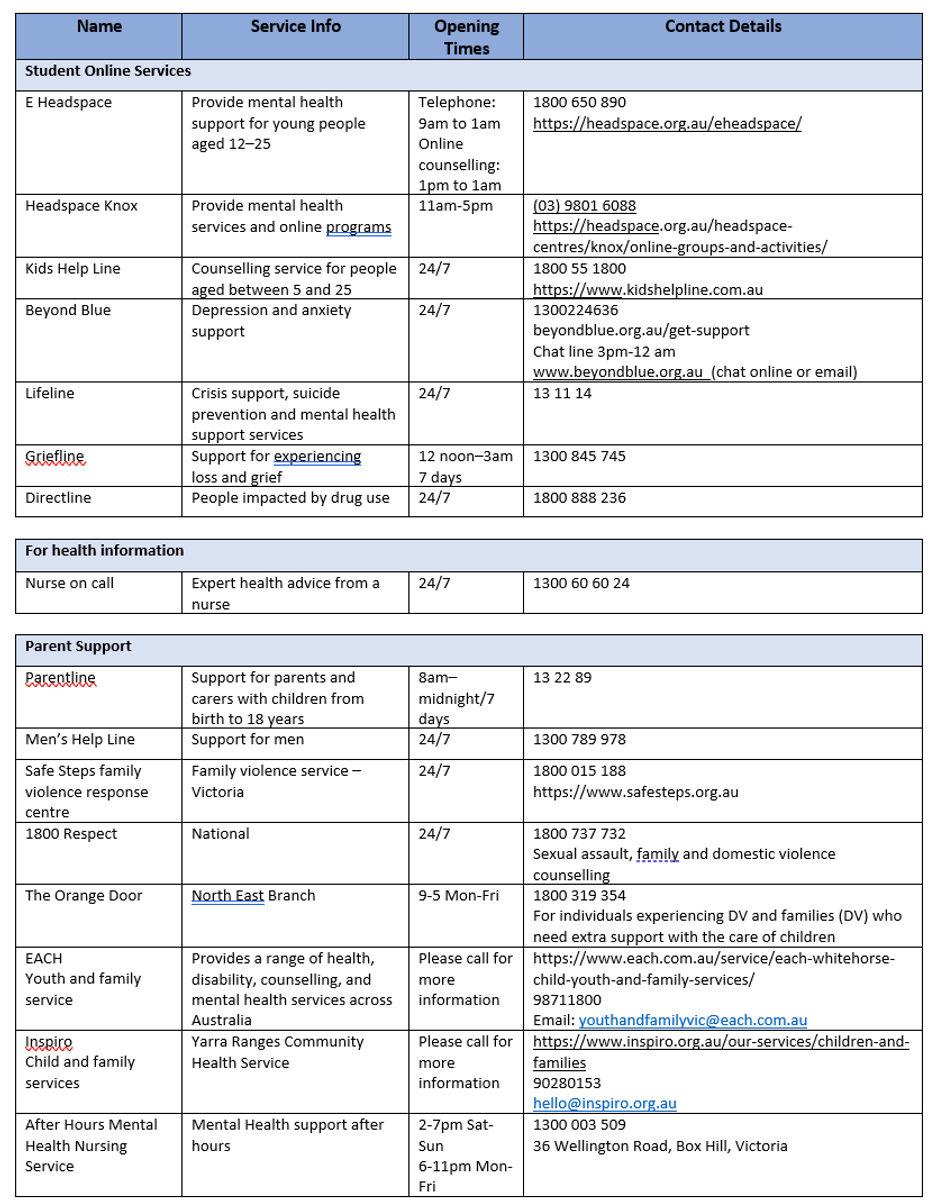WELLBEING

MANAGING ANXIETY AT SCHOOL
It is normal to feel some anxiety about school, especially at the start of the year. If you’re feeling anxious you are not alone, there are many students feeling the same and there are lots of strategies you can use to help manage anxiety. Anxiety turns on our body’s stress response (also called fight or flight) which prepares us to react quickly and protect ourselves when faced with danger. However, many people feel anxious in situations that are stressful to them but aren't dangerous. For example, when things are new at the start of the year, when taking tests, or speaking in class. If you feel anxious in situations like these, you’re not alone. But it’s best to learn how to cope. Otherwise, anxiety can hold you back or cause you to avoid things you’d like to do. Instead of avoiding things that create anxiety, it’s better to face them. You might be surprised by what you can do.
Here are five things that can help you through anxious moments:
- Start with a ‘growth’ mindset. Rather than “this is who I am, I can’t speak in class” try thinking “with practice I can become more confident.”
With effort and practice our brains can learn new ways thinking and this includes reducing anxiety. - Notice how anxiety affects your body. When you’re anxious, do you feel "butterflies" in your stomach? Sweaty palms? Shaky hands? A faster heartbeat? Tight muscles? These feelings are part of your body’s stress response. They can be uncomfortable, but they aren't harmful. You can cope! Next time you feel them, try to notice them without getting upset or trying to stop them.
- Breathe. When you feel anxious, take a few slow breaths. Breathe in slowly. Be sure to breathe out all the way. You can use your fingers to count four or five breaths, in and out. Breathing slowly helps reduce the body’s stress response.
- Face the situation — don’t wait for anxiety to go away. You might think that you’ll put off speaking in class or talking to that new person until you no longer feel anxious about it. But it doesn’t work that way. It’s facing the anxiety that helps you lower it.
Learning to cope with anxiety takes time, patience and practice. Start with one small step. If your anxiety feels extreme or hard to cope with, or if you're feeling anxious about a problem you need help with, tell a parent or another adult you trust.
For more information check out:
https://kidshealth.org/en/teens/anxiety-tips.html
https://headspace.org.au/explore-topics/for-young-people/anxiety/
USEFUL CONTACTS
| Emergency services | 000 |
| Lifeline Crisis Support - Suicide Prevention | 13 22 89 |
| Family Violence counselling support | 1800 737 732
|
| Kids Helpline – Counselling for people 5-25 years | 1800 55 1800 |
| Headspace – mental health info and phone counselling for 12-25 years | 1800 650 890 |
| Parentline – Counselling and support for parents and carers | 13 22 89 |
| Q Life - LGBTI peer support | 1800 184 527 |
| Relationships Australia – relationship counselling | 1300 364 277 |
| Beyond Blue – mental health info and support | 1300 22 4636
|
| Inspiro Community Health | 9738 8801 |
WATER IS BEST!
Article prepared by Courtney Croxford Secondary School Nurse (2024)
A ‘sugary’ drink refers to a beverage with added sugars or sweeteners. This includes soft drinks, but also sports drinks, energy drinks, fruit drinks, flavored milk drinks, vitamin ‘waters,’ flavoured mineral waters, and cordial. Sugary drinks are a major contributor to the added sugar in the Australian diet, which is contributing to tooth decay, weight gain and other health risks such as heart disease, kidney disease, type 2 diabetes, stroke, and some cancers. The Australian Dietary Guidelines do not recommend drinking any sugary drinks, due to all the unneeded sugar and lack of other important nutrients (e.g., proteins, vitamins, minerals, fiber).
To help your family cut back sugary drink consumption, you could consider:
- Carry a water bottle for every member of the family, so you do not have to buy a drink if you are thirsty and encourage your child to fill their drink bottle before school.
- If they are thirsty, encourage family members to drink some water first.
- Be wary of health claims on drinks like ‘contains vitamins’ – refer to the amount of sugar on the nutrition panel.
- If you have a sugar craving, eat a whole piece of fruit, rather than have a sugary drink.
- If you are ordering a fast-food meal, ask for water or diet drink instead of the default sugary drink.
- When it comes to fruit juice, opt for only small amounts of 100% fruit juice and check the packaging to make sure there is no added sugar.
- Be aware that sports drinks are also full of sugar and acid and are not necessary for children or adolescents to drink. Water will rehydrate them, is cheaper and better for them overall.
- If you do need a sugary drink, choose the smallest serving size and do not keep large bottles at home.
If you would like more information, check out the Rethink Sugary Drink website at: www.rethinksugarydrink.org.au
References
Dieticians Australia (2022), Sugary Drinks, accessed 8/1/2024, Sugary drinks | Dietitians Australia
Rethink Sugary Drink (2022), Tips and Resources, accessed 8/1/2024 Sugary drink free tips & resources - Rethink Sugary Drinks
HEALTH AND WELLBEING SERVICES/CONTACTS -
KNOX, MAROONDAH, YARRA RANGES

